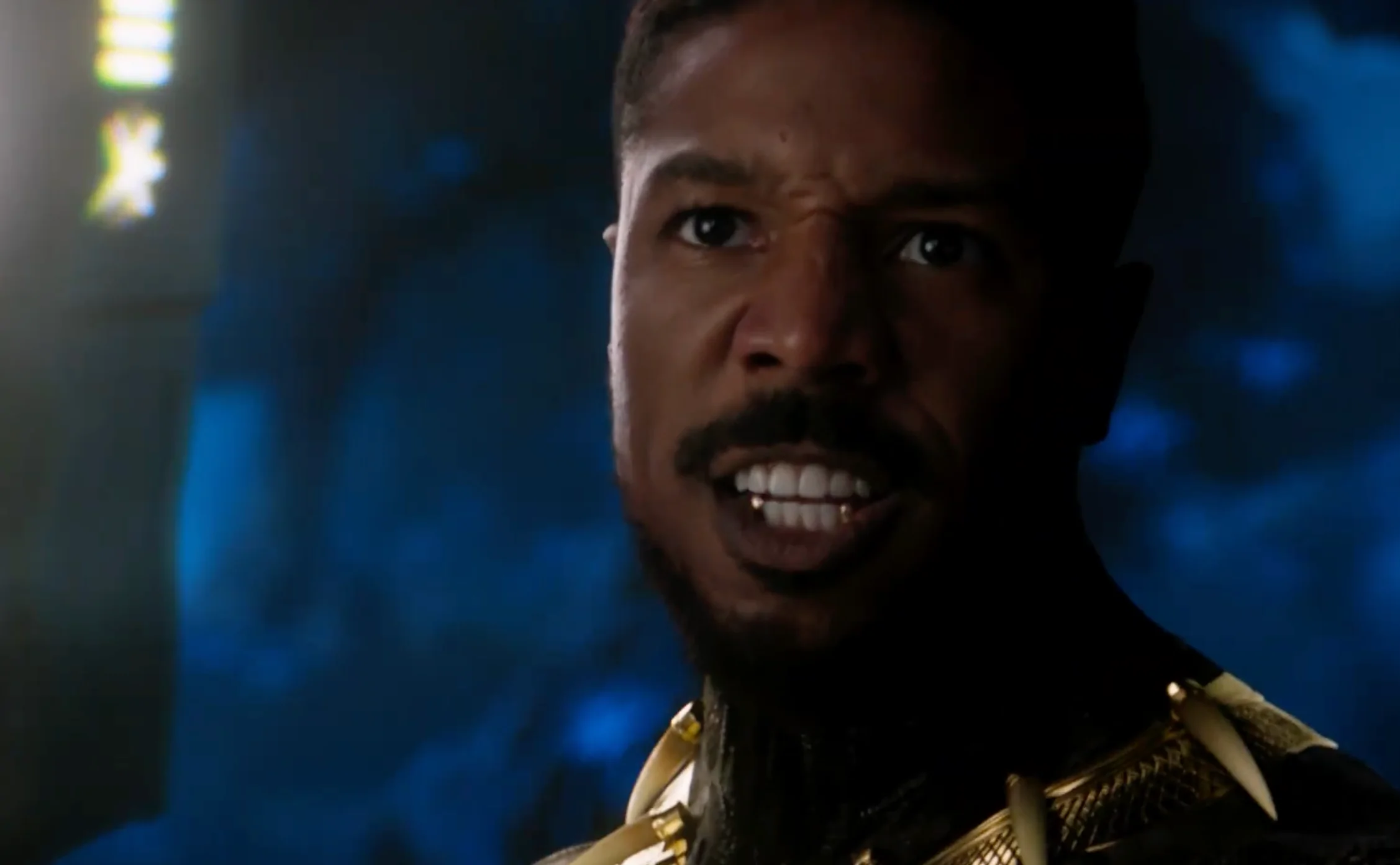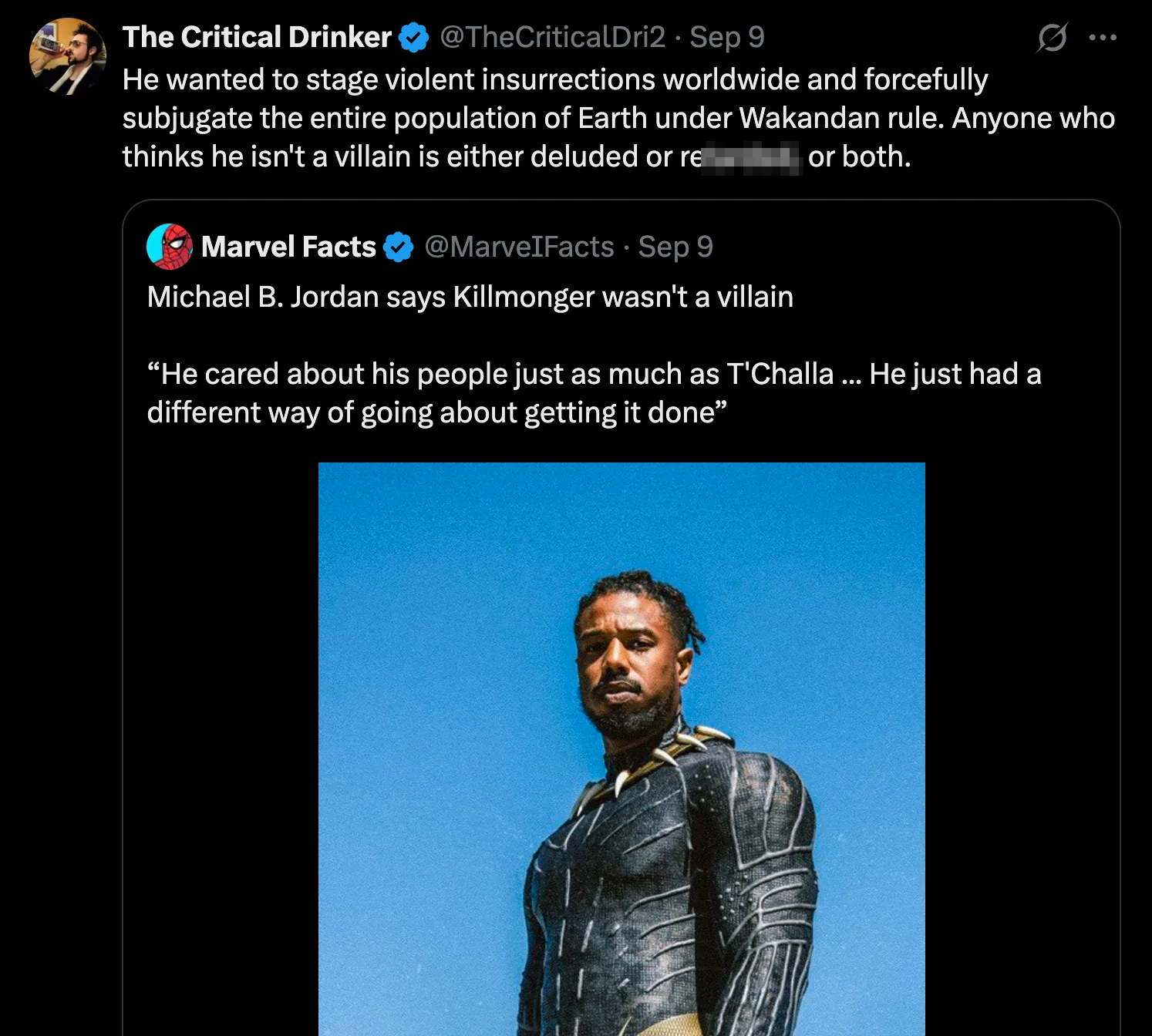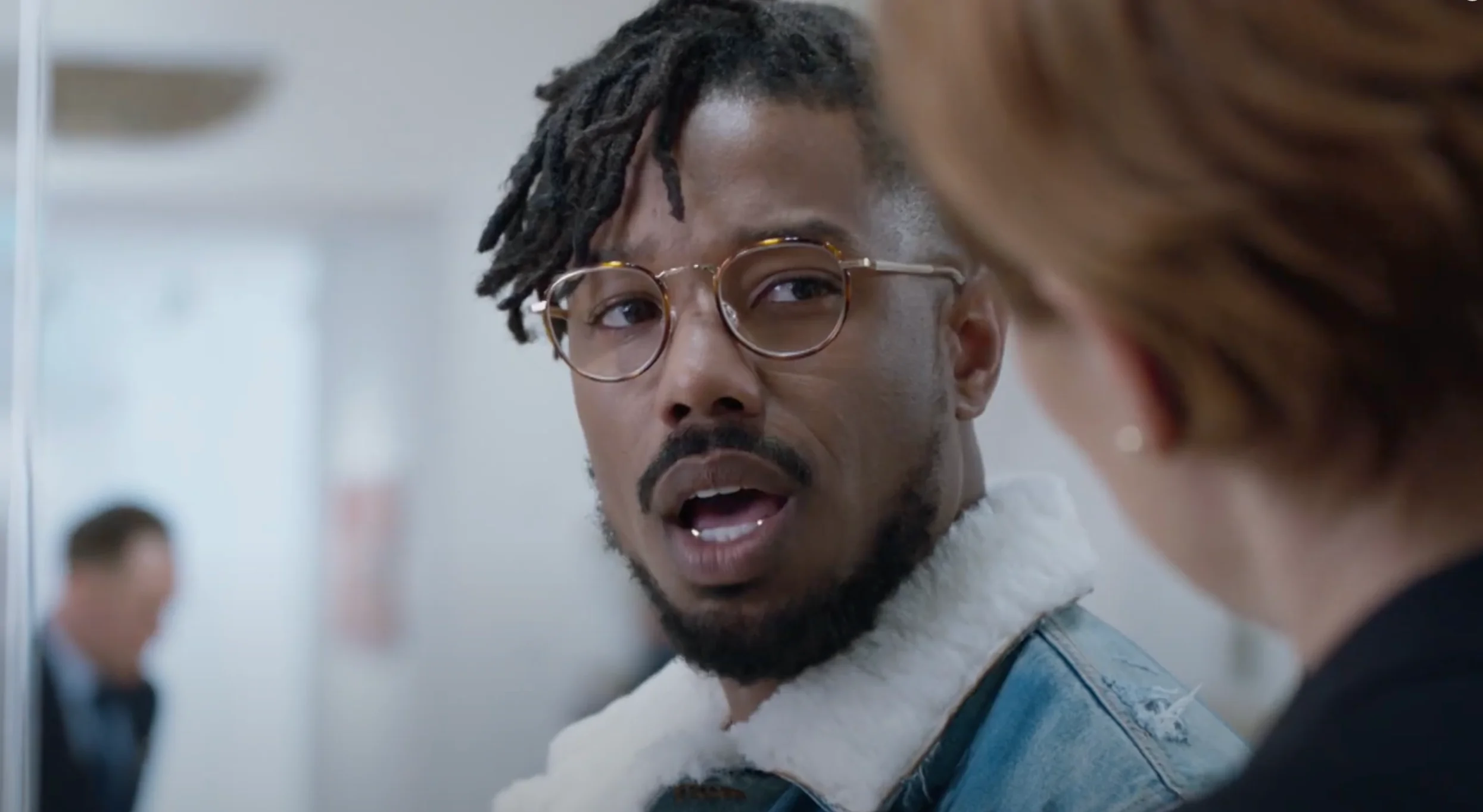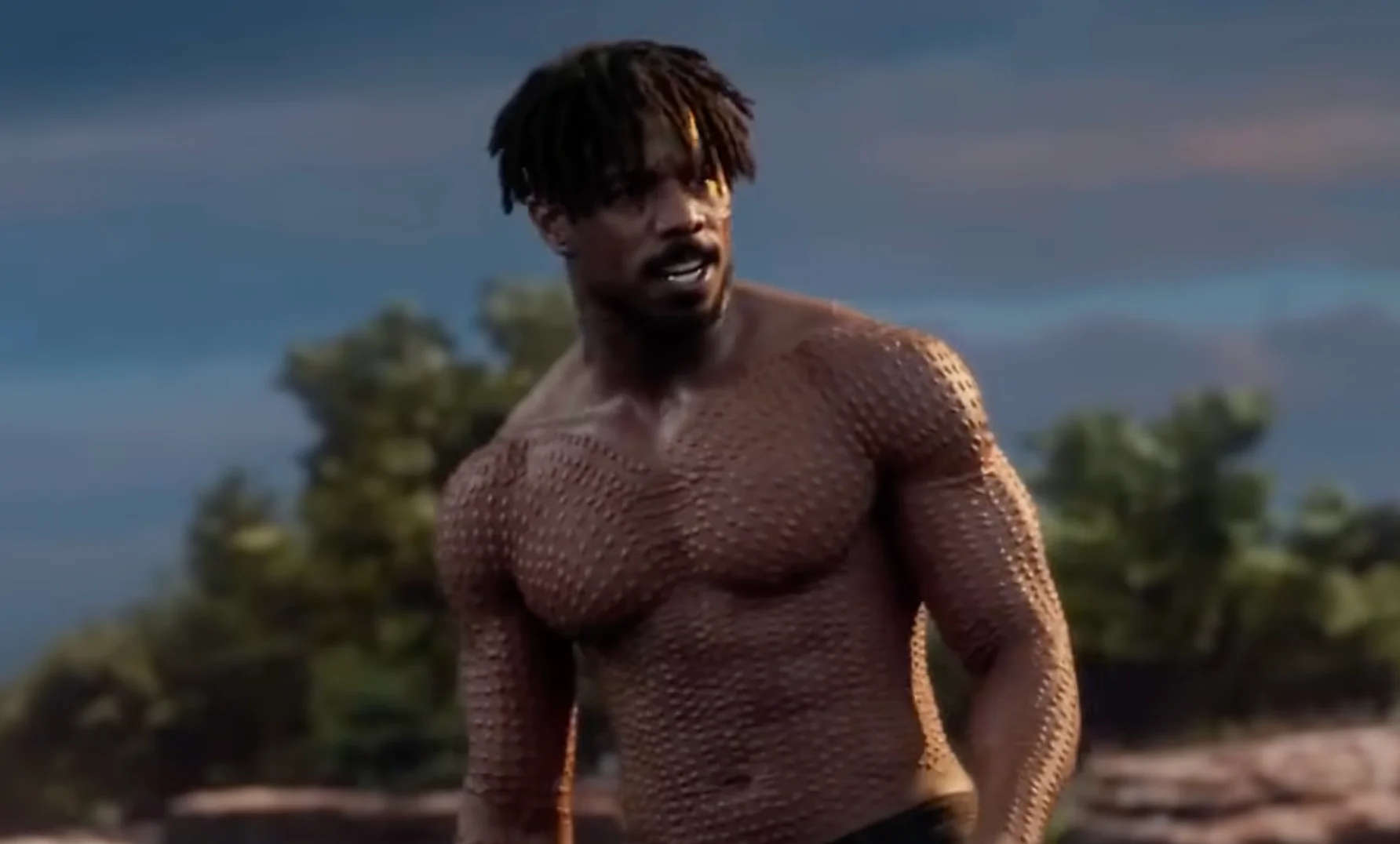
Last December 2021, Michael B. Jordan had a discussion with Taylor Rooks from Bleacher Report about his character in Marvel’s Black Panther – specifically Killmonger, the on-screen adversary he played. During their talk, the topic of whether Killmonger should be seen as a villain or not emerged. In response to this direct question, Jordan’s answer has sparked curiosity and is now fueling intense debate among fans once again.
Michael B. Jordan says Killmonger wasn’t a villain
His concern for the community was equivalent to Black Panther’s, but he approached achieving it differently.
— Marvel Facts (@MarveIFacts) September 9, 2025
Jordan stated, “He held the same level of concern for his people as T’Challa, but he approached things in a unique manner.
In simpler terms, Jordan’s portrayal of Killmonger as more complex than a typical comic book villain didn’t gain significant traction in 2021. However, in 2025, this perspective is being revisited and clashing with one of the most heated debates in America, due to a resurgence of the related clip. Jordan posits that Killmonger was not just a bad guy; he was depicted as intelligent, educated, and driven by genuine suffering.
The Character of Killmonger
In the movie “Black Panther” directed by Ryan Coogler, Erik Stevens is initially presented as a soldier with roots in Wakanda who once served in the U.S. black-ops. His past, marked by abandonment following his father’s death in Oakland, stirs within him anger and ambition. However, rather than having noble intentions, his ultimate scheme was far from it.

Instead of utilizing Wakanda’s sophisticated weaponry and technology for the purpose of arming oppressed individuals worldwide, Killmonger aimed to assert global dominance, with Wakanda serving as the central power. His objective involved inciting uprisings through violent means across all continents, ultimately seeking to establish himself as the dominant force on Earth.
- Topple governments worldwide.
- Subjugate populations under Wakandan rule.
- Eradicate those who stood in the way—including, explicitly White populations he viewed as oppressors and colonizers.
In essence, Killmonger’s primary goal was expansion rather than freedom as many believe. While he often spoke of liberation, his actions were more autocratic in nature. This is the ethical perspective that fans are referencing now, as Jordan’s previous comments have once again become a topic of discussion.
Why the Quote Is Resurfacing Now
Jordan’s comments from 2021 might have easily been overlooked in the vast universe of Marvel history. However, in the past few weeks, that particular clip has been rapidly gaining traction and making headlines on various social media platforms.
Why? Context.
BREAKING 🚨 Karoline Leavitt just exposed every reporter for NOT reporting on Iryna’s mu*rder:
Several journalists here have written extensively criticizing Daniel Penny, who intervened to secure a New York City subway car from a disturbed individual.
ABSOLUTE MIC DROP 🔥
— MAGA Voice (@MAGAVoice) September 9, 2025
As a movie enthusiast, I’ve been deeply affected by the tragic event involving Iryna Zarutska and Decarlos Brown Jr., particularly the chilling incident that occurred on the subway. This unfortunate incident has sparked intense discussions about interracial violence in our society, with the media shining a spotlight on this issue.
In light of these events, a quote from a renowned Black Hollywood actor defending a character whose objective was racial dominance carries a significantly different weight than it did last year. This statement now resonates more profoundly and provokes thoughtful reflection within our current cultural climate.
Initially, the debate over Jordan’s portrayal of a fictional villain was seen as nuanced. However, it now appears insensitive or even worse to many, given the current context. The situation has become clear: Jordan’s defense of Killmonger is being scrutinized in light of recent news headlines, and the outcome is a major controversy.
Social Media Reactions: Fans and Commentators Push Back
The aftermath of Jordan’s previous comment wasn’t subtle. Critics from various pop culture realms, including popular celebrities, have responded harshly and without mercy.
On platform X, YouTube personality The Critical Drinker contested the notion that Killmonger was not portrayed as a villain in the movie.

He envisioned instigating violent uprisings globally to establish Wakandan dominion over every Earth citizen, according to The Drinker. Those who don’t consider him a villain are either misguided, brainwashed, or both.
Former WWE superstar and current AEW wrestler Ricochet echoed the criticism.
I HATE this narrative.
Regardless of his background, it’s unjustifiable for him to have taken the lives of innocents. Using violence against the innocent to make a point is never acceptable, and he clearly embodied the role of the antagonist.
— Lightskin Kingpin (@KingRicochet) September 10, 2025
I strongly dislike this narrative because it portrays the unjustified killing of innocent people. Regardless of any compelling background details, taking innocent lives to make a point is utterly wrong. In this context, he undeniably played the role of the antagonist.
He was a villain. Period.
— Steph Anie (@mynerdyhome) September 9, 2025
Steph Anie of MyNerdyHome didn’t mince words either when she said, “He was a villain. Period.”
He was, in fact, a villain.
— Brett Dasovic (@Brettdasovic) September 9, 2025
Brett Dasovic, host of Pop Culture Crisis, added “He was, in fact, a villain.”
Instead, while Jordan attempted to stir controversy in 2021 by suggesting that Killmonger was not portrayed as a villain, the general consensus seems to be that his actions should not be glorified or justified as heroic, even within the context of fiction.
Hollywood’s Habit of Sympathizing With Villains
Hollywood hasn’t shied away from revamping the image of antagonists on multiple occasions. In more contemporary productions, there’s been a noticeable emphasis on creating “compelling adversaries,” characters who may perpetrate heinous acts but are provided with heart-wrenching backstories intended to evoke empathy from viewers.
In these examples, Disney, Star Wars, and Warner Bros. have chosen to portray characters like Maleficent, Kylo Ren, and the Joker as complex individuals who were previously seen solely as villains. Instead, they are now depicted as misunderstood anti-heroes (Maleficent), broken young men (Kylo Ren), or even sympathetic figures (the Joker). This shift in perspective aims to offer a fresh take on these characters and engage audiences with their backstories and motivations.

However, unlike other characters, Killmonger’s situation is distinct. His ambition wasn’t merely harsh-it portrayed racial domination as noble. Glorifying or condoning such an ideology, even under the guise of complexity, can be risky. This is the very point that critics are currently emphasizing.
2018 saw Marvel fans hailing Killmonger as an engaging antagonist. In 2021, Jordan suggested he wasn’t a villain in the traditional sense. However, by 2025, with racial unrest frequently making headlines, there’s less tolerance for seemingly sympathetic extremist characters who may portray questionable views.
Why This Killmonger Villain Debate Matters in 2025
Pop culture isn’t isolated from its surrounding context. What might have appeared as casual actor comments initially, can take on a whole new meaning when revisited over time. The resurfaced Jordan interview doesn’t simply focus on Marvel; instead, it sheds light on how narratives intertwine with cultural discourses.

At its core, the argument over Killmonger reflects something larger:
- How do we draw the line between understanding a villain and excusing them?
- What happens when fiction echoes real-world grievances?
- Do actors bear responsibility for how their character interpretations are received in different contexts?
These are the questions fueling the firestorm.
Is Killmonger a True Villain?
Michael B. Jordan’s interview with Taylor Rooks, which took place nearly four years ago, has resurfaced in 2025. This reemergence showcases the fluidity of cultural interpretation. What was once regarded as profound storytelling may now potentially be perceived as a tacit endorsement of controversial ideas that are being enacted in the present day.
In the realm of Black Panther, my empathy certainly lies with Killmonger due to his profound struggles. Yet, it’s undeniable that his methods-domination, expansion, annihilation-solidified his role as the antagonist, without a shadow of a doubt.
Pretending otherwise may have seemed edgy in 2021. In 2025, it feels reckless.

Michael B. Jordan might have aimed to emphasize complexity, but this reemerging quote serves as a reminder: when fiction intersects with actual violence, viewers aren’t tolerant of uncertainty. Killmonger wasn’t misinterpreted as a revolutionary figure; he was the antagonist. And in today’s world, there’s little appetite for debate on this matter.
Read More
- Clash Royale Best Boss Bandit Champion decks
- Vampire’s Fall 2 redeem codes and how to use them (June 2025)
- Mobile Legends January 2026 Leaks: Upcoming new skins, heroes, events and more
- World Eternal Online promo codes and how to use them (September 2025)
- Clash Royale Season 79 “Fire and Ice” January 2026 Update and Balance Changes
- Best Arena 9 Decks in Clast Royale
- M7 Pass Event Guide: All you need to know
- Clash Royale Furnace Evolution best decks guide
- Best Hero Card Decks in Clash Royale
- How to find the Roaming Oak Tree in Heartopia
2025-09-12 16:00